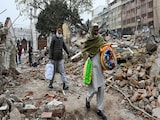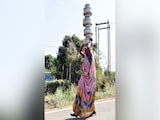Friends and families on Sunday mourned the deaths of 10 people who died when a cliff collapsed onto tourist boats on a lake in Brazil, after two people missing in the tragedy were confirmed dead.
On Saturday, a large rock fragment broke free of a ravine and plunged onto four boats in Furnas Lake in Brazil's eastern Minas Gerais state, as panicked tourists watched helplessly from other vessels.
The bodies of the two remaining missing individuals were found Sunday by rescuers, civil police commissioner Marcos de Souza Pimenta told reporters.
More than 30 people were injured, including nine who had to be hospitalized, authorities said.
The ten who died were part of a group of family and friends on the boat that suffered the biggest impact from the rockfall, according to rescuers.
The victims were all Brazilian nationals, aged between 14 and 68, according to preliminary investigations.
Tourists flock to see the cliffs, caverns and waterfalls that surround the green waters of Lake Furnas, formed by the hydroelectric dam of the same name.
Dramatic videos shared on social networks captured the moment the cliff collapsed.
One such video showed the minute before the incident, with several people warning that "lots of stones are falling" and yelling at the occupants of other boats to move away from the rock face.
President Jair Bolsonaro retweeted some of these videos on his account and called the cliff fall a "disaster."
Ramilton Rodrigues, a friend of one of those who were killed, was waiting with family members for the bodies to arrive at a forensic institute in Passos, a city some 44 km from the scene of the accident.
My friend "came to the Capitolio area to celebrate his birthday, he would have turned 25 this Sunday, but was killed a day earlier," Rodrigues told AFP while waiting amid great anguish.
A diving squad had to pause its search overnight for safety reasons, but other rescuers continued working. Divers resumed their search Sunday.
Extremely heavy rain has fallen in recent days in southeastern Brazil, possibly precipitating the collapse, according to firefighters.
Geographer Eduardo Bulhoes of the Fluminense Federal University told AFP that rock falls in the area were more likely to occur during the rainy months of December and January.
To avoid future accidents, he said, it would be advisable to keep tourists further away from the cliffs during the rainy season.
(Except for the headline, this story has not been edited by NDTV staff and is published from a syndicated feed.)















